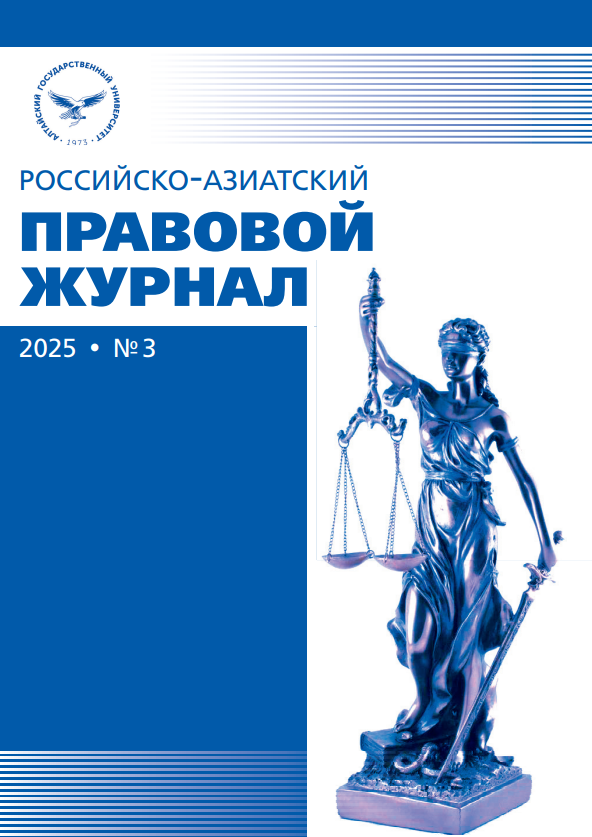TO THEORETICAL DEFINITION OF THE CONCEPT OF “DEGRADATION OF WATER BODIES”
УДК 343.775 ББК 67.407.4
Abstract
The article reveals the problem of qualification of offenses expressed in pollution of water bodies as aresult of discharge of wastewater or other types of pollutants due to non-compliant treatment facilities ofeconomic entities. The article points out the practical significance of the explanations of the Presidium of theSupreme Court of the Russian Federation contained in the “Review of judicial practice on the applicationof environmental legislation” dated June 24, 2022, recommending that the facts of exceeding the maximumpermissible concentration in wastewater be qualified as sufficient legal grounds for recognizing this act asan offense leading to the degradation of a water body. The author's version of the definition of the concept of“degradation of a water body” is proposed for use in law enforcement practice.
Downloads
References
2. Боковня А.Ю. Уголовно-наказуемое загрязнение вод: понятие и вопросы квалификации // Ученые записки Казанского университета. Серия: Гуманитарные науки. 2018. №2. С. 464–475.
3. Румянцев Ф.П. Проблемы формирования единообразной судебной практики по искам о загрязнении водных объектов: сборник материалов Международной научно-практической конференции «Российское правосудие: история, современность и тенденции развития», посвященной 100‑летию Верховного Суда Чувашской Республики. Чебоксары, Чувашский государственный университет им. И.Н. Ульянова, 2022. С. 66–70.
4. Уголовный кодекс Российской Федерации от 13.06.1996 №63‑ФЗ // СЗ РФ от 17 июня 1996 г.№25. Ст. 2954.
5. Голубев С.И. Экологическое преступление: в лабиринте определений // Lex Russica. 2017. №9 (130). С. 145.
6. Власов В.А., Сигаева Н.О., Толстиков В.А. Некоторые актуальные проблемы правоприменения и вопросы совершенствования уголовно-правовой ответственности за загрязнение вод (ст. 250 УК РФ) // Право и государство: теория и практика. 2020. №2 (182). С. 39–41.
7. Жевлаков Э. О разграничении экономических и экологических преступлений: теория, законодательство, практика // Уголовное право. 2017. №2. С. 55–63.
8. Исаенко В.Н. Возможности использования криминалистики и специальных знаний при осуществлении прокурорского надзора // Законность. 2018. №6. С. 25–29.
9. Липски С.А. Некоторые проблемы, связанные с правовым режимом земель водного фонда // Великие реки 2019: Труды научного конгресса 21‑го Международного научно-промышленного форума: в 3 т. Н. Новгород, 2019. С. 183–185.
10. Водный кодекс Российской Федерации от 03.06.2006 №74‑ФЗ // СЗ РФ от 5 июня 2006 г. №23. Ст. 2381.
Copyright (c) 2025 Ф. П. Румянцев, Ю. Н. Зверева

This work is licensed under a Creative Commons Attribution 4.0 International License.
Russian-Asian Law Journal is a golden publisher, as we allow self-archiving, but most importantly we are fully transparent about your rights.
Authors may present and discuss their findings ahead of publication: at scientific conferences, on preprint servers, in public databases, and in blogs, wikis, tweets, and other informal communication channels.
Russian-Asian Law Journal allows authors to deposit manuscripts (currently under review or those for intended submission) in non-commercial, pre-print servers such as ArXiv.
Authors who publish with this journal agree to the following terms:
- Authors retain copyright and grant the journal right of first publication with the work simultaneously licensed under a Creative Commons Attribution License that allows others to share the work with an acknowledgement of the work's authorship and initial publication in this journal.
- Authors are able to enter into separate, additional contractual arrangements for the non-exclusive distribution of the journal's published version of the work (e.g., post it to an institutional repository or publish it in a book), with an acknowledgement of its initial publication in this journal.
- Authors are permitted and encouraged to post their work online (e.g., in institutional repositories or on their website) prior to and during the submission process, as it can lead to productive exchanges, as well as earlier and greater citation of published work (See The Effect of Open Access).








